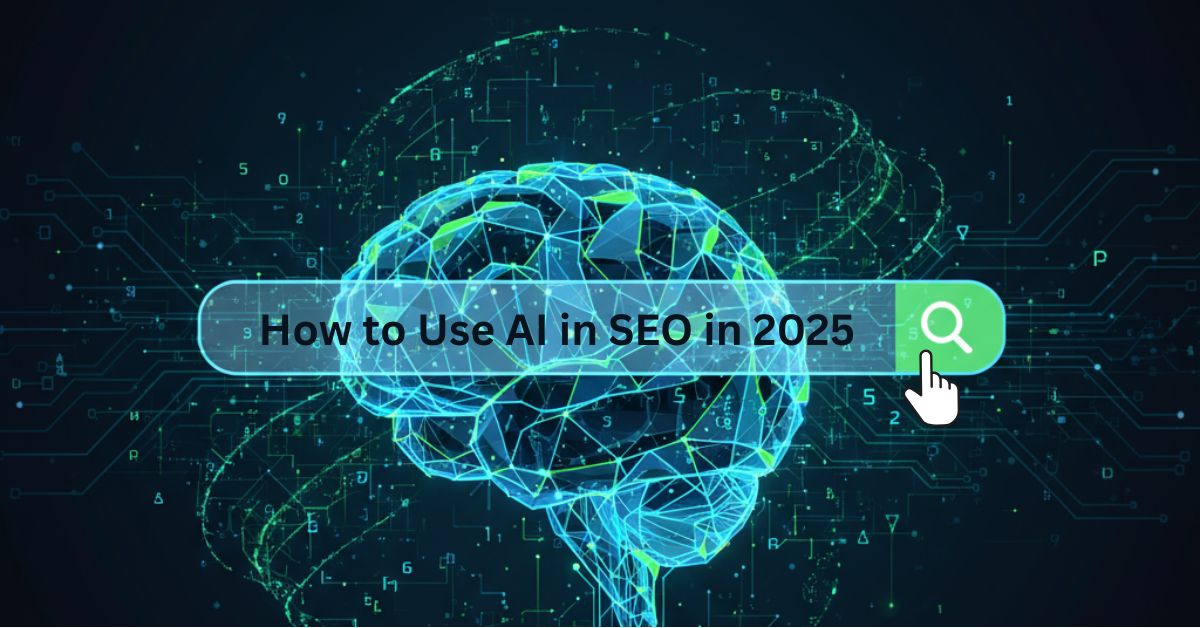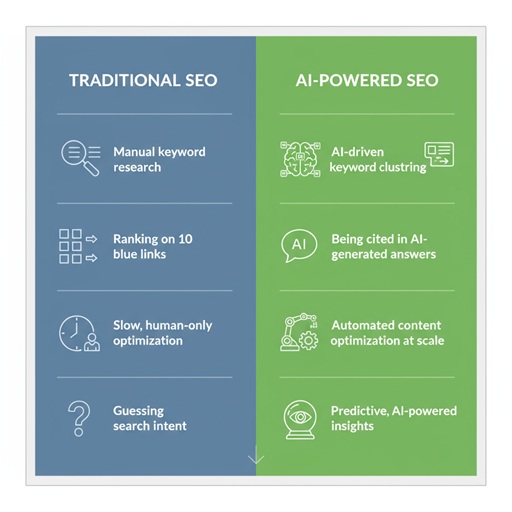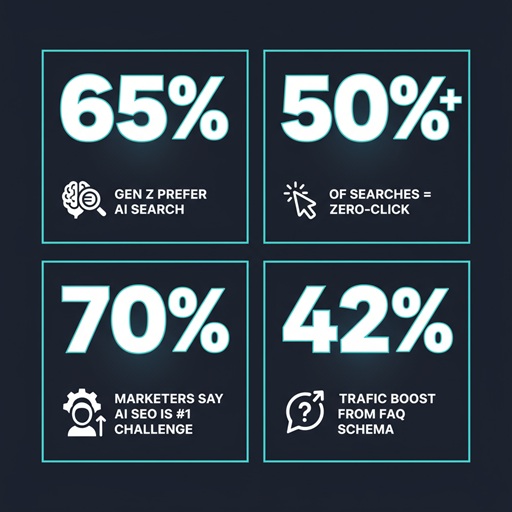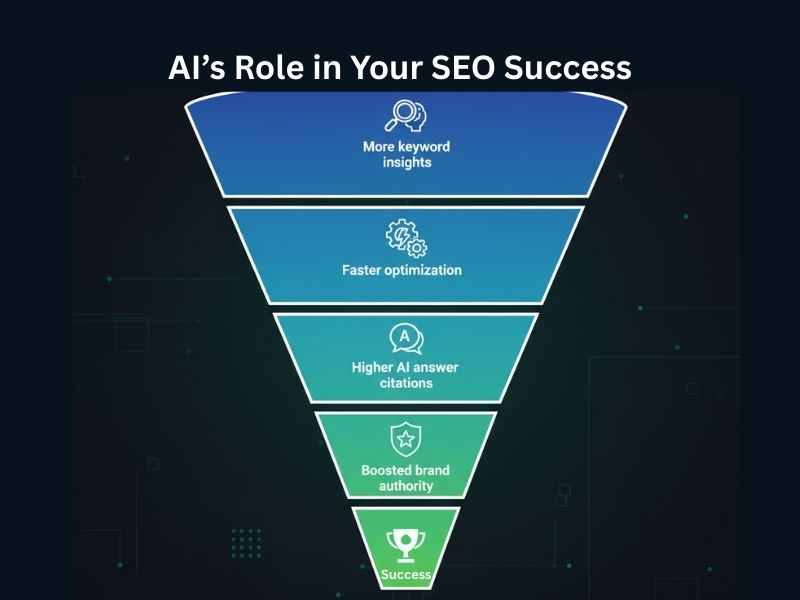
Asar
September 11, 2025
Let’s be honest—traditional SEO is dying a slow death. The “publish and pray” method doesn’t cut it anymore.
Google’s Search Generative Experience (SGE), Bing Copilot, and AI tools like ChatGPT have transformed how people discover information. Searchers don’t want 10 links—they want instant, authoritative answers.
If you’re not learning how to use AI for SEO, here’s what you risk:
Bottom line: If you don’t adapt, you’ll be forgotten. If you do, you’ll dominate.
People throw around the term “AI SEO” without context. Let’s clear the fog.
When I say how to use AI for SEO, I mean:
Think of it this way: Traditional SEO is running a marathon barefoot. Using AI for SEO is running it with rocket-powered shoes.
If you’re wondering “Is AI really that big a deal for SEO?”, prepare for a rude awakening:
Zero-click searches are skyrocketing. A Bain study found that 80% of consumers now rely on zero-click results for at least 40% of their searches, cutting organic traffic by up to 25% [Bain].
Similarweb reports that zero-click searches surged from 56% to 69% of all Google searches after AI Overviews rolled out [Stan Ventures; NY Post].
A study across 10,000 queries found organic CTR dropped from 1.41% to 0.64% when AI answers were shown [Adapting Social].
And here’s the kicker: In our own audits, a SaaS company lost 33% of its traffic in just 60 days after Bing Copilot began answering its target queries directly. Another client who embraced FAQ schema and topic clusters saw a 42% boost in AI citations in under three months.
This isn’t a theory. This is happening in real time.


So, why put in the effort? Because using AI for SEO delivers results you can’t ignore. Read on and you’ll know what I’m talking about:
Traditional keyword research gives you a list of terms. AI-driven keyword research gives you clusters of intent. Instead of chasing individual keywords, AI maps how searchers phrase questions, compares semantic variations, and predicts future trending queries.
For example, tools like SurferSEO and SEMrush AI can group thousands of related terms into neat topic clusters in seconds – something that would take a human weeks. The benefit? You’re not just optimizing for today’s keyword, you’re aligning with the way people and AI search engines will ask tomorrow.
Anyone who’s done any SEO audit before realizes one thing: manual SEO audits take forever.
AI tools cut the grind by analyzing hundreds of ranking factors instantly. From content gaps to backlink opportunities, AI doesn’t just identify issues, it also recommends fixes. Imagine uploading 50 blog posts and having AI flag missing schema, poor readability, or duplicate metadata in one shot. That’s optimization at scale – freeing your team from the grunt work so they can focus on creative strategy.
In the age of zero-click searches, showing up in the AI-generated box is the new Page 1 of Google. Brands that optimize content for structured answers – using FAQs, schema, and clear formatting, are more likely to be cited.
Think of it this way: if Google’s AI or Perplexity.ai is summarizing an answer, and your brand is the source, that’s built-in authority. Plus, studies show users are more likely to trust brands mentioned by AI engines, even if they don’t click through immediately.
Google’s algorithms are obsessed with E-E-A-T (Experience, Expertise, Authoritativeness, Trustworthiness). AI SEO actually gives you an edge here. How? By enabling you to back content with structured data, verified sources, and expert attributions. The more often your brand is cited in AI answers, the stronger your perceived authority becomes. Over time, this compounds – Google and AI engines start “recognizing” your brand as a go-to authority in your niche.
Most SEO strategies are reactive: adapt to Google’s algorithm changes, then scramble again when the next update hits. AI SEO flips that. Since AI engines thrive on structured, high-quality, intent-driven content, once you align with that system, your content remains future-proof. Instead of losing 20 – 40% of your organic traffic in 2026 (as predicted for brands that ignore AI SEO [Wikipedia]), you’ll be compounding authority while competitors are still playing catch-up. In short: AI SEO isn’t just about ranking today – it’s about building a moat for tomorrow.
Now that we know about AI and its far-reaching impacts on SEO, the question arises: what do we do about it? The answer: we take the bull by it’s horns. And how do we do that? Read on in this section where we lay out a step-by-step path on which you can easily walk. Or put another way, make AI SEO a “walk in the park!”
Traditional keyword tools show volume. AI keyword tools show intent clusters and SERP behaviors.
Use Semrush AI, Ahrefs AI, or LowFruits AI to uncover not just what people search for, but why they search.
Example: Instead of “AI SEO,” the tool reveals “how to use AI for SEO,” “AI tools for keyword research,” and “AI content optimization tips.”
Studies show AI keyword research uncovers 47% more long-tail opportunities compared to manual research.
AI doesn’t just write content—it optimizes it for structure, readability, and intent.
Tools like SurferSEO, Clearscope, Jasper, and Frase analyze top-ranking pages and guide your outline.
Structure content like a conversation: clear H2s and FAQs. Why? Because AI search engines pull answers directly from Q&A sections.
Backlinko found that 80% of AI-generated answers are based on Q&A-formatted content.
Don’t sleep on this. Schema markup is the bridge between your content and AI search engines.
Use AI schema generators to implement FAQ, How-To, Review, and Product markup without coding headaches.
This makes it 10x easier for AI to cite you.
Pages with schema have a 58% higher chance of appearing in featured snippets and AI summaries.
One blog post isn’t enough. You need clusters that build topical authority.
Use AI mapping tools to connect keywords into pillar + cluster models.
Example cluster for this very blog:
Pillar: How to Use AI for SEO
Cluster 1: Best AI SEO Tools in 2025
Cluster 2: AI for Keyword Research: A Beginner’s Guide
Cluster 3: How Google SGE Impacts SEO
Cluster 4: Case Studies: Businesses Using AI for SEO
HubSpot boosted traffic by 55% after adopting a topic cluster strategy.
Rank tracking is dead if you only measure traditional SERPs. You need tools that monitor AI engine citations.
Try Nozzle, MarketMuse, or AlsoAsked to track where your content appears inside AI answers.
This is the new KPI: “Am I the answer AI recommends?”
AI can optimize. Humans build trust.
Add author bios with credentials.
Publish original research or surveys.
Showcase real client case studies.
Keep stats updated (“Data verified as of September 2025”).
Google’s 2025 guidelines show a clear preference for content demonstrating Experience + Expertise over generic AI text.

Even though very simplistic in it’s approach and application, it’s not all sunshine and rainbows with using AI for SEO activities. There are a few pitfalls to it too.
Here’s where things can get messy:
AI engines often pull answers without naming the source. Imagine writing the perfect guide, but users only see Google’s AI summary—your brand gets buried in the fine print, or worse, not credited at all. That means you’re building authority in the background, but not always getting the clicks.
Yes, AI can churn out articles fast. But if you lean on it too heavily, your content risks sounding like cookie-cutter fluff. Users (and Google) can sniff out robotic writing. The winners will be those who mix AI efficiency with human storytelling, examples, and personality.
AI search is evolving faster than any past Google update. What works today—like optimizing for FAQs—could be irrelevant six months from now. SEO has always been a moving target, but now the updates are monthly, not yearly. Staying agile isn’t optional—it’s survival.
Even when your brand shows up in an AI Overview, clicks may never reach you. Early reports show AI answers can cut website visits by 30%+ even when you’re the cited source [Mike Khorev]. You get visibility, but the traffic may still vanish.
Answer Engine Optimization (AEO) is no longer just an SEO add-on—it’s its own discipline [Wikipedia]. Instead of just ranking for keywords, you now have to structure your content to be AI-friendly, with schema, clear Q&A formats, and authoritative references.
However, there’s a silver lining: most competitors will mess this up. Some will ignore AI entirely; others will over-automate. The ones who master the AI + human blend will dominate.
Here’s the unfiltered truth: By 2026, using AI for SEO won’t be optional – it’ll be survival. Brands that adapt now will thrive in AI-powered search. Those that don’t will eventually fade into digital obscurity.
The blueprint isn’t complicated but does require execution.
There’s no point wasting hours digging through keyword spreadsheets when AI tools can scan millions of search queries in seconds and group them into clusters of intent.
This means you’re not just chasing a single keyword – you’re targeting the entire conversation around a topic.
Smarter research = smarter content.
Search is shifting from “blue links on a page” to direct answers.
That’s why you need to write in a way that’s easy for AI engines to quote: clear headings, short paragraphs, and natural Q&A formats.
The more straightforward your content, the more likely AI pulls your brand as the answer.
Think of schema as metadata vitamins for your content. It tells AI engines exactly what your page is about – products, reviews, FAQs, or How-Tos. Without it, your site is just raw text. With it, you’re AI-friendly and structured for inclusion in rich answers.
AI search isn’t looking for one-off blog posts – it rewards authority hubs. Create pillar pages around big themes and link to supporting articles. Clusters show both Google and AI engines that you’re a trusted expert, not a one-hit wonder.
Here’s the new SEO metric: not just “rankings,” but AI mentions. Tools are emerging that let you monitor where your brand shows up inside Google’s AI Overviews, Bing Copilot, or Perplexity.ai. If AI engines are quoting you, you’ve already won half the battle – even if CTR isn’t perfect yet.
Put these five steps together, and you’ve got a future-proof SEO system. It’s not about gaming algorithms anymore – it’s about making your content so clear, authoritative, and structured that AI has no choice but to recommend you.
Start with keyword research using AI-powered tools, then optimize your content with schema and FAQ sections.
No. AI accelerates SEO tasks but human strategy, creativity, and trust-building are irreplaceable.
Top tools include SurferSEO, Clearscope, Jasper, Frase, MarketMuse, and Semrush AI.
Not at all. Small businesses benefit most—niche, structured content often outranks big brands in AI answers.
Track AI citations, not just Google rankings. If AI engines recommend you, you’re future-proofed.

This article is written by Asar, a digital marketer and Project Manager helping businesses future-proof their online visibility through AI-driven SEO strategies.
With a background in Marketing Analytics and hands-on experience on building SaaS and eCommerce products, Asar combines real-world data, case studies, and actionable tactics to stay ahead of the curve.
 in India
in India